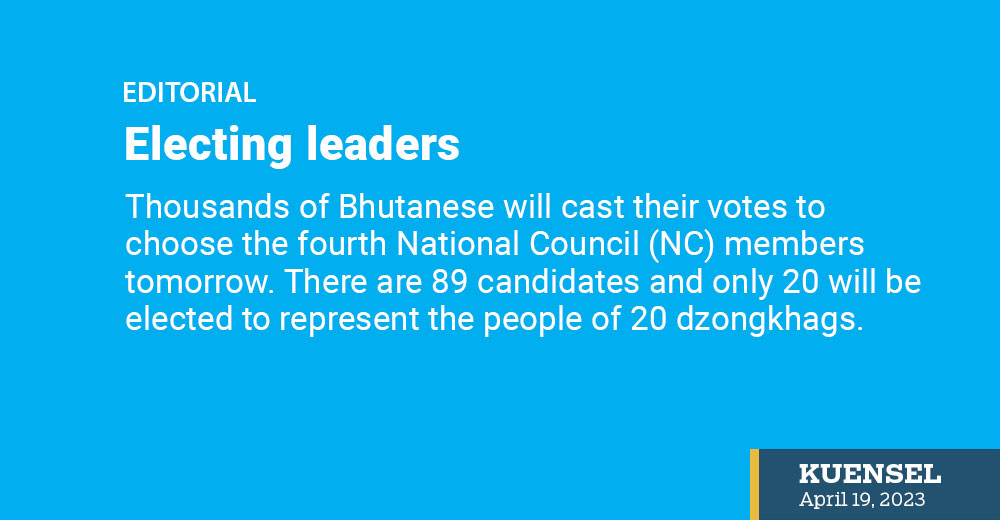Thousands of Bhutanese will cast their votes to choose the fourth National Council (NC) members tomorrow. There are 89 candidates and only 20 will be elected to represent the people of 20 dzongkhags. A lot has been said about the fourth NC elections. The views are mixed, like in past elections. Some say it is not as exciting as in the past while some are of the view that this NC elections would have the lowest voter turnout.
The details will be known on April 21 when the Election Commission of Bhutan (ECB) releases the details of winners and losers and the voter turnout. It may be not exciting for those who were not following or those not involved in the elections. But there certainly is a huge group who will shoulder the responsibility to exercise their franchise. Election is a responsibility.
There are 485,811 eligible voters according to the final electoral roll the ECB made public. As expected, there are more female eligible voters – 249,071, more than 50 percent of the total eligible voters. Out of the total, 105,704 have registered as postal voters.
Voting is a right and a responsibility. That there will be fewer voters this year is attributed to the restriction on postal ballot facility and facilitation booths. This could hamper voter turnout to an extent, but if voters feel that voting is a responsibility more than right, they will turn up at the polling stations. Election rules guarantee the rights of voters to demand leave of absence from work to take part in the election. If voters are not interested, nobody can force them to vote.
While this may be also their right, there are more than rights and responsibilities in taking part in the electoral process. As a close-knit society, those standing for elections count on their network before making a decision. This may not be the first priority, but it sure is an important factor.
Voter turnout also depends on the number of candidates contesting the elections. It is an open secret that Bhutanese voters are obliged to vote when they have a relative or a friend contesting in an election. More than the rights or responsibility, the number of candidates could determine the turnout. That is why we have people without postal ballot facility travelling from Haa to Trashigang, for instance, to cast their ballot even if it’s a full five-day trip.
Candidates expect their network of family and friends to turn up at polling stations or cast through postal ballots. To make it convenient, transportations are arranged, if not by the candidates, by their relatives or supporters. Those not turning up will not go unnoticed.
There will be new and old faces in the 25-member National Council (including the five eminent members). Whom we elect depends on many factors. The average voter, without any relative or friend contesting, says they will give a “chance” to new faces. This may be the way we elect or vote, but it is a concern worth noting of how we elect people’s representatives. Giving an opportunity to a new candidate for the perks is not the best reason.
Meanwhile, political parties are waiting to see the impact of some decisions the ECB made. If they see a huge drop in voter turnout, they would lobby for voting facilities – extending postal ballot facilities and the facilitation booths.


